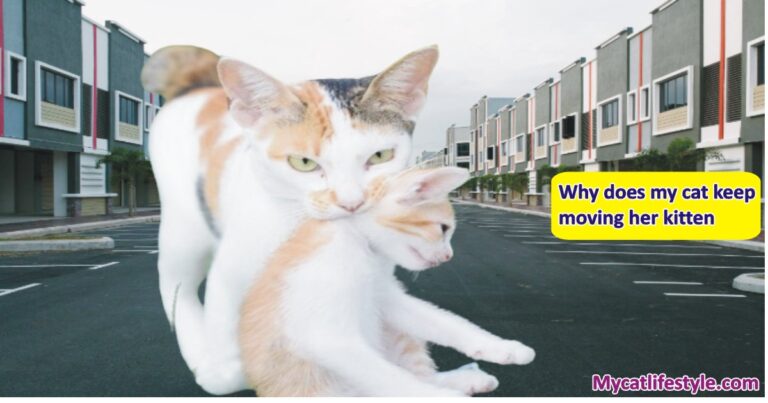Can I Spray Perfume on My Cat? [What Cat Owners Need To Know]
![Can I Spray Perfume on My Cat? [What Cat Owners Need To Know]](https://mycatlifestyle.com/wp-content/uploads/2023/10/Mycat-lifestyle.com-4.png)
We have an important question for all cat lovers and inquiring minds today: Can I spray perfume on my darling kitty companion? Hold on to your hats, for the answer is a thundering NO!
NO, IT IS NOT RECOMMENDED. Cats have sensitive skin and an acute sense of smell, which can result in skin irritations, allergies, and discomfort. Perfume can also cause respiratory problems in cats. Even if your cat inhales a small amount of perfume, he or she will develop serious health issues, which may result in death in certain cases.
While it may be tempting to add a beautiful aroma to your cat’s natural attractiveness, this seemingly simple deed might have severe effects. A lot of scents that we find appealing are overwhelming and even dangerous to cats. You may be wondering if spraying perfume around cats is safe, or what would happen if your cat sniffs the perfume accidentally. Don’t worry; we’ve got your back.
In this article, we will discuss why spraying perfume on your cat is not only inappropriate but also possibly injurious. So be ready for some eye-opening revelations that will keep both you and your furry friend safe and sound.
![Can I Spray Perfume on My Cat? [What Cat Owners Need To Know]](https://mycatlifestyle.com/wp-content/uploads/2023/10/Mycat-lifestyle.com-4.png)
Is Perfume Toxic To Pets
Many people use perfume as a scented product, but have you ever wondered if it is detrimental to your pets? Yes, scent may be harmful to pets, particularly cats. In this part, we’ll go over the risks of spraying perfume on your cat and how it might damage their health.
Cats are notorious for their grooming habits, and they lick themselves continuously to remain clean. This implies that whatever is on their fur will invariably wind up in their mouth and digestive system. Perfumes include several compounds, including alcohol, essential oils, and artificial aromas, which can be toxic to cats if consumed.
The high percentage of alcohol in fragrances is one of the key issues contained. Because cats have a lesser body mass than humans, they are more vulnerable to the effects of alcohol. Cats may mistakenly consume it if it is sprayed directly on their skin or fur while grooming themselves. Alcohol poisoning can result, causing vomiting, diarrhea, reduced coordination, and even respiratory failure.
Find Out More: Why Are My Cat’s Nails Splitting?
Can Cats Smell Perfume?
Cats have a highly developed sense of smell, with over 200 million olfactory receptors in their nostrils, as opposed to our five million. This implies that they can detect odors far more sharply than humans. It’s natural for cat owners to question if their feline pals can detect perfume.
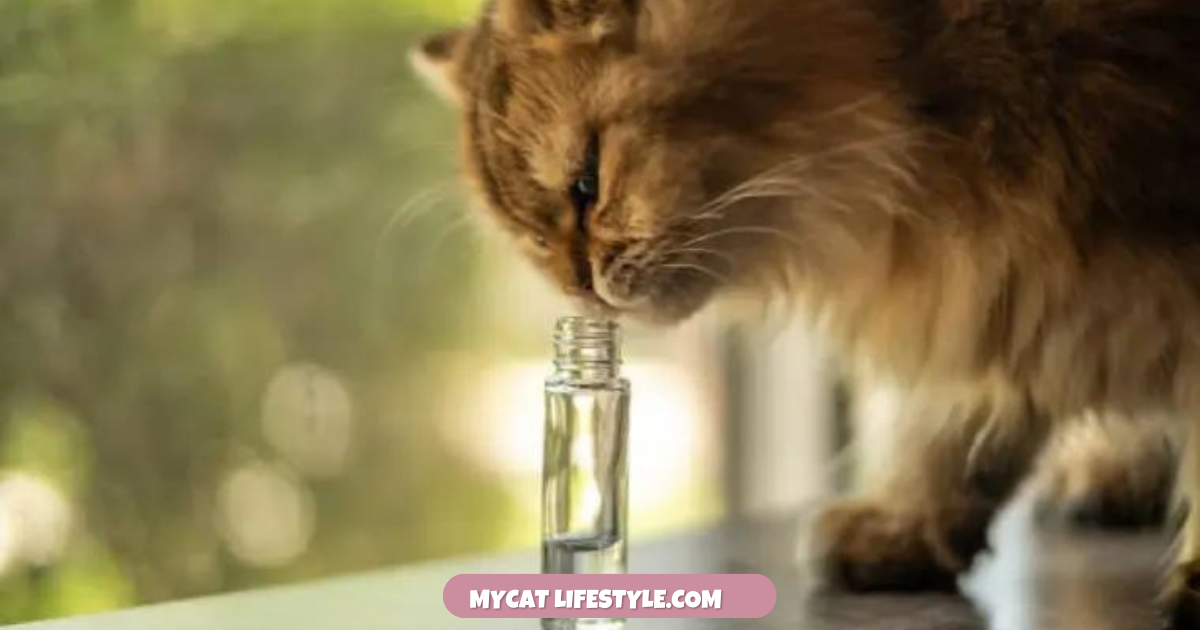
The answer is true, cats can detect scent. Because of their acute sense of smell, they may even be able to recognize individual chemicals in the perfume. However, just because they can detect odors does not imply that they are safe.
Perfumes and other perfumes include many compounds that, if consumed or absorbed via the skin, can be dangerous to cats. These Chemicals such as alcohol, essential oils, and artificial perfumes can cause irritation, allergic responses, and even poisoning in cats.
Cats have distinct fragrance preferences than humans; what we find nice may be overpowering to them. It’s also worth noting that spraying perfume straight into your cat’s fur isn’t a good idea because it might create respiratory problems.
How Can I Make My Cat Smell Good? Alternatives to Perfume for Cats
Cats are well-known for their hygiene and natural ability to groom themselves. However, there may be times when your pet’s coat does not smell as nice as you would want. While some pet owners may use perfume on their cats, this is neither safe nor encouraged. The perfume includes chemicals and synthetic aromas that, if consumed or breathed, can be dangerous to cats. So, how can you make your cat smell nice without endangering them?
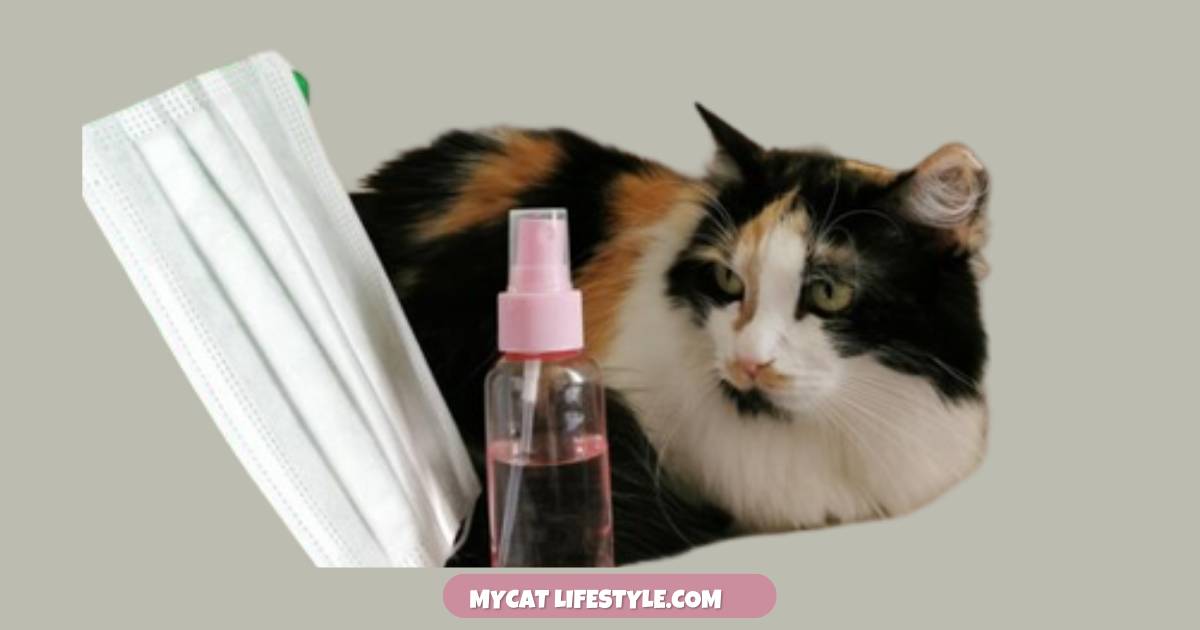
Here are several perfume alternatives to keep your kitty companion smelling fresh and tidy.
1. Brushing regularly
Brushing your cat’s fur regularly not only removes loose hair and prevents matting, but it also distributes natural oils throughout the coat, keeping it lustrous. as well as fit. These oils have a faint perfume that keeps your cat’s fur smelling nice. It also increases blood flow, which leads to a healthier coat and skin.
2. Mild Shampoo
If your cat has rolled around in anything stinky or made a mess, giving them a wash with a mild cat shampoo is the safest approach to remove any unwanted odors. Look for shampoos created exclusively for cats that have natural components and avoid ones that contain strong smells or harsh chemicals.
3. Shampoo that does not require water
Waterless shampoos might be useful when giving your cat a complete wash is not feasible. These treatments, which are generally in spray form, may immediately refresh your cat’s coat.
Can I Spray Perfume in the Same Room as My Cat?
If you own a cat, you may have pondered if it is acceptable to spray perfume in the same room as your feline companion. The answer is emphatically NO; it is not safe for your cat’s health.

Perfumes, colognes, and other scented goods frequently include chemical components that are toxic to cats. These chemicals can irritate your cat’s fragile respiratory system, causing breathing difficulties, allergies, and skin irritation.
Cats are especially vulnerable to airborne pollutants due to their tiny size and rapid metabolism. Even trace levels of these pollutants can be harmful to your feline friend’s health.
Can I Spray Perfume on My Cat? What Happens If You Accidentally Spray Perfume On Your Cat?
Spray perfume on your cat, as attractive as it may appear, is not a smart idea. Cats are delicate animals with sensitive skin and a keen sense of smell. Most perfume chemicals are toxic to cats and can cause a variety of health problems.
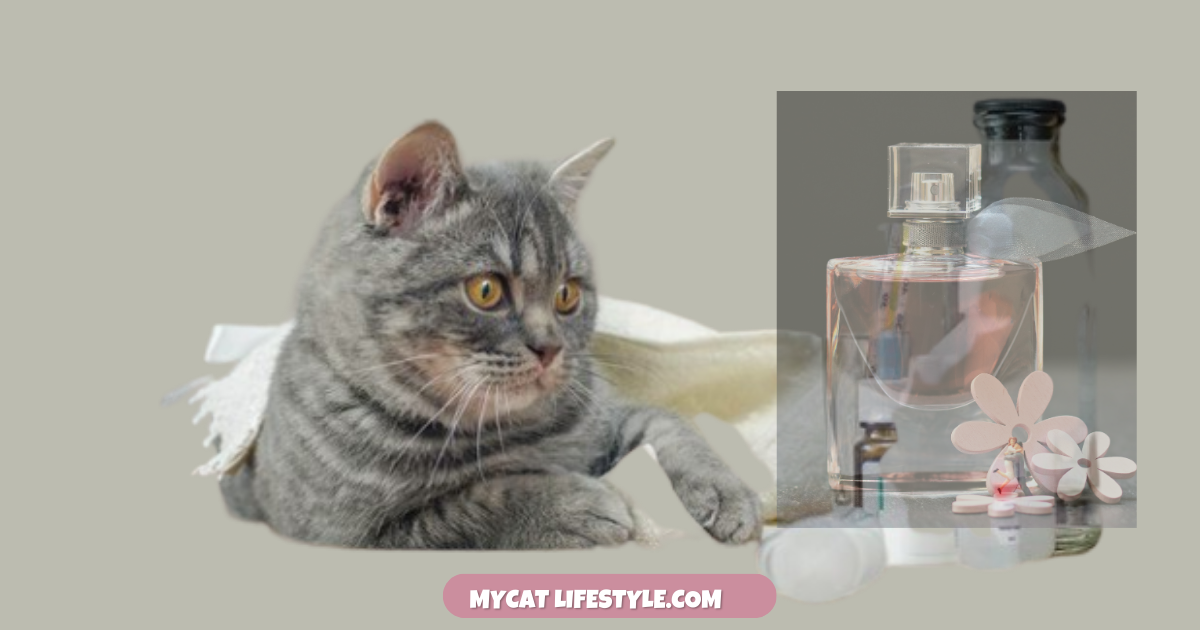
To begin with, cats have a far greater sense of smell than humans. Perfume smells might be overpowering for them, causing respiratory issues or headaches. Furthermore, perfume compounds such as alcohol, essential oils, and preservatives might irritate their nose and throat, causing sneezing, coughing, or difficulty breathing.
Cats are naturally clean creatures who groom themselves by licking their hair regularly. When you apply perfume to your cat’s fur, they will try to eat it off, perhaps eating toxic compounds that will make them sick.In the unfortunate event that you accidentally spray perfume on your cat, you must act swiftly.
First and foremost, do not worry or chastise your cat, since this will just add to their discomfort. Instead, use a moist cloth or paper towel to gently remove the perfume. If your cat has consumed perfume, keep an eye out for any indications of disease and seek veterinarian care if required.
Do Cats Like The Smell of Perfume? Do Cats Like Perfume?
Many people who own cats as grooming their feline pets and frequently question if spraying perfume on them is safe. After all, who wouldn’t want their cat to smell like a lovely bunch of flowers or a high-end luxury perfume?
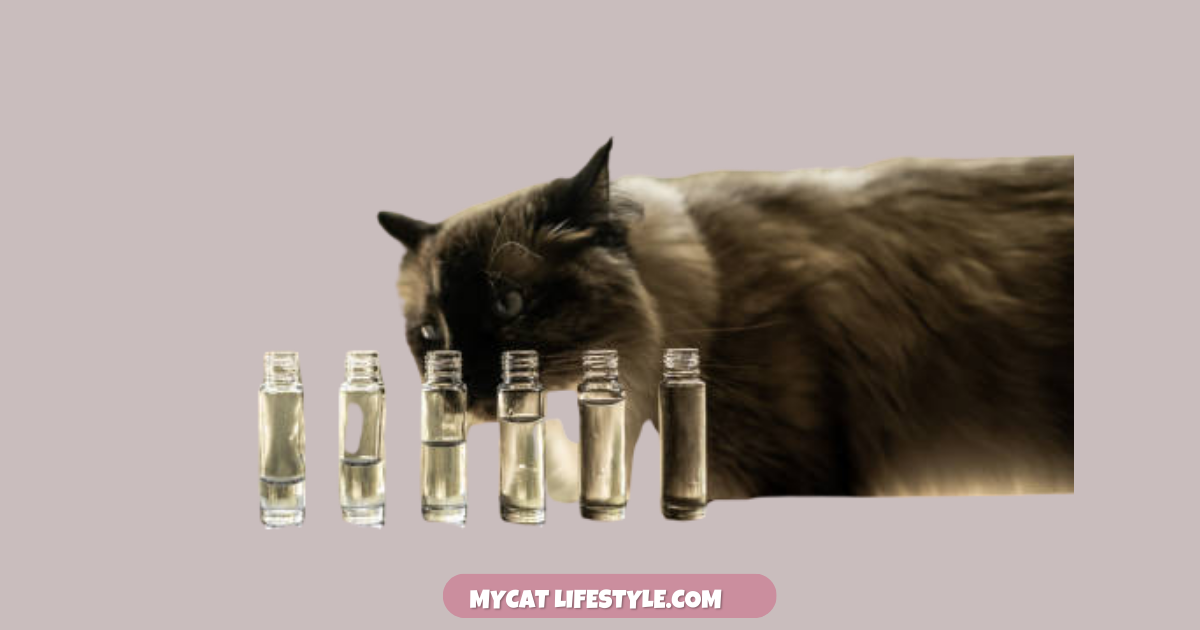
However, before you grab your favorite bottle of perfume, think about whether cats love the smell.
Do Cats Like The Smell of Perfume?
The reply to this question is not as simple as you may believe. Some fragrances can attract the curiosity of some cats, and they may even exhibit signs of satisfaction when exposed to perfumes or other aromas. However, the majority of cats do not react favorably to strong fragrances such as perfumes.
Cats have a high sense of smell and are sensitive to aromas that people find pleasant but that they find overpowering. Their sense of smell is approximately 14 times stronger than ours, therefore strong fragrances such as perfume can quickly overwhelm them.
Cats also have smell glands in different regions of their bodies, including their face, paws, and tail. Pheromones are produced by these glands. which are used to interact with other cats. When a foreign fragrance (like perfume) is sprayed on them, it could affect these natural signals and create confusion or anxiety.
Does Perfume Confuse Cats?
Many cat owners may have pondered if it is okay to spray perfume on their feline companion. Spraying perfume on a cat may have devastating consequences and should be avoided at all times.
One of the primary problems with putting perfume on cats is that their sense of smell is far more sensitive than ours. Humans have roughly 5 million olfactory receptors in our nostrils, whereas cats have approximately 200 million. This means they are far more sensitive to varied fragrances and can be quickly overpowered by strong aromas like perfume.
Strong fragrances might not only create pain in cats, but they can also elicit other bodily reactions. Cats are extremely reliant on their
Can Perfume Kill Cats
Perfume is a common product that many people use to improve their perfume and make them smell nice. However, when it comes to spraying perfume on pets, particularly cats, several measures must be considered. In reality, spraying perfume on your cat can be dangerous and even fatal in extreme situations. Let’s look at why perfume might be harmful to cats:
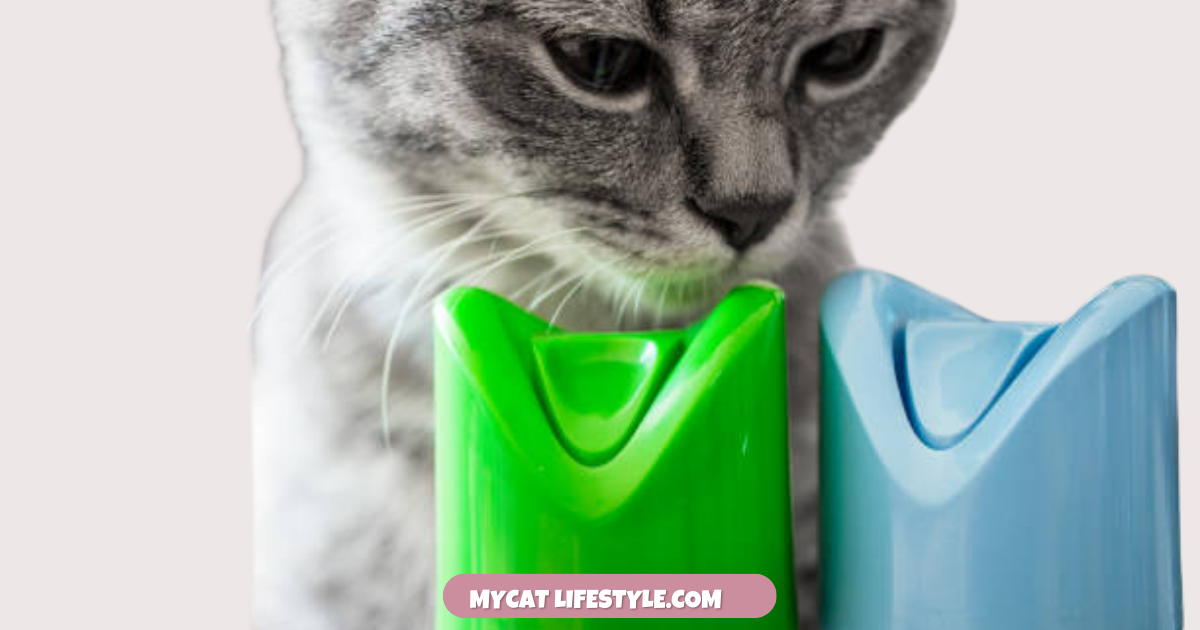
Aromatherapy oils:
Many fragrances include essential oils like lavender, peppermint, or eucalyptus, which appear to be safe but can be poisonous to cats. If your cat consumes these oils, it may experience skin irritation, trouble breathing, and potentially liver damage.
- Alcohol content:
- Respiratory issues:
- Accidental ingestion:
Cats are known for their grooming routines, in which they lick themselves clean numerous times every day. If you spray perfume on your cat’s fur, they may absorb it while licking, which might lead to poisoning.
How can I keep my cat safe from perfume?
Perfume may smell wonderful to us, but it may be unhealthy and even lethal to our feline companions. Cats have an extremely acute sense of smell, and their bodies are not designed to deal with the chemicals present in fragrances. The ASPCA considers perfume to be a household poison for cats.
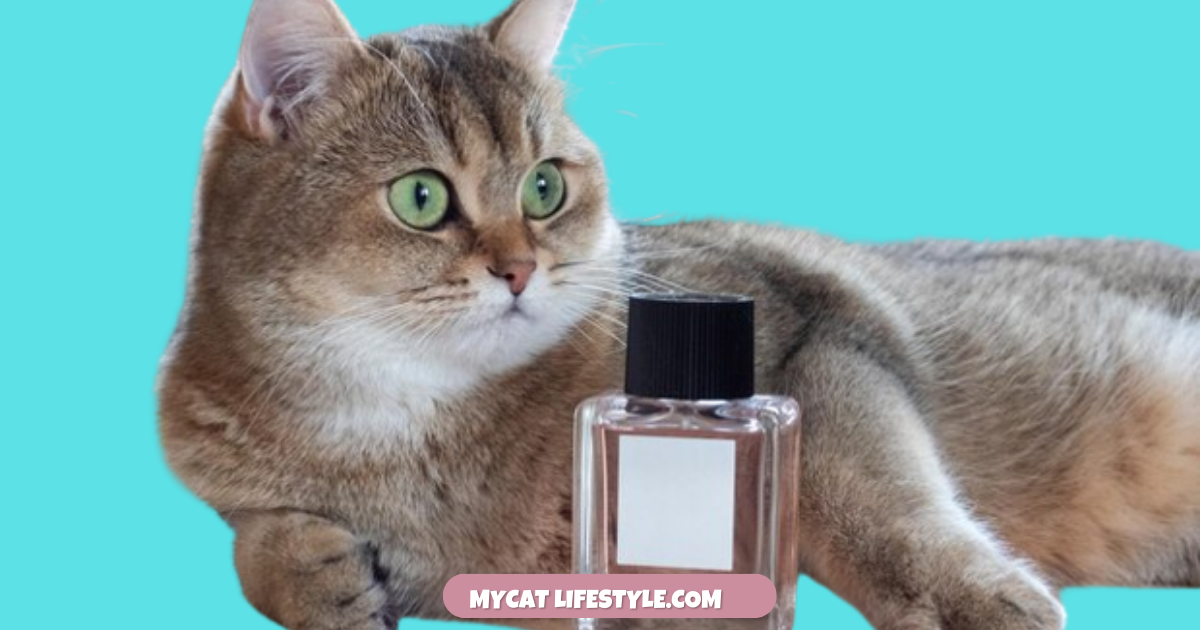
If you often use perfume or want to use it near your cat, you must take care to keep them safe. Here are some suggestions for keeping your cat perfume-free:
1. Do not spray perfume directly on your cat.
Although this may seem apparent, it’s worth noting that you should never spray perfume straight into your cat’s fur. Not only will these Strong fragrances overpower their delicate nose, but they may also consume the toxins when grooming themselves.
2. Keep fragrant goods out of reach of children.
Cats are inquisitive creatures who like sniffing and tasting their environment. All fragrant goods, such as body sprays, lotions, and oils, should be kept out of reach of your cat. Keep them in cupboards or drawers that your pet cannot reach.
3. Avoid using perfumed cleaning products.
Cleaning agents with strong odors, such as floor cleaners, air fresheners, and fabric sprays, can be dangerous to cats if they come into touch with them or inhale the fumes.
Which Perfume Is Safe For Cats
As much as we like relaxing us and smelling great, it is vital to note that not all scented items are suitable for our feline companions. Perfumes, for example, can be hazardous or even poisonous to cats if applied to them.
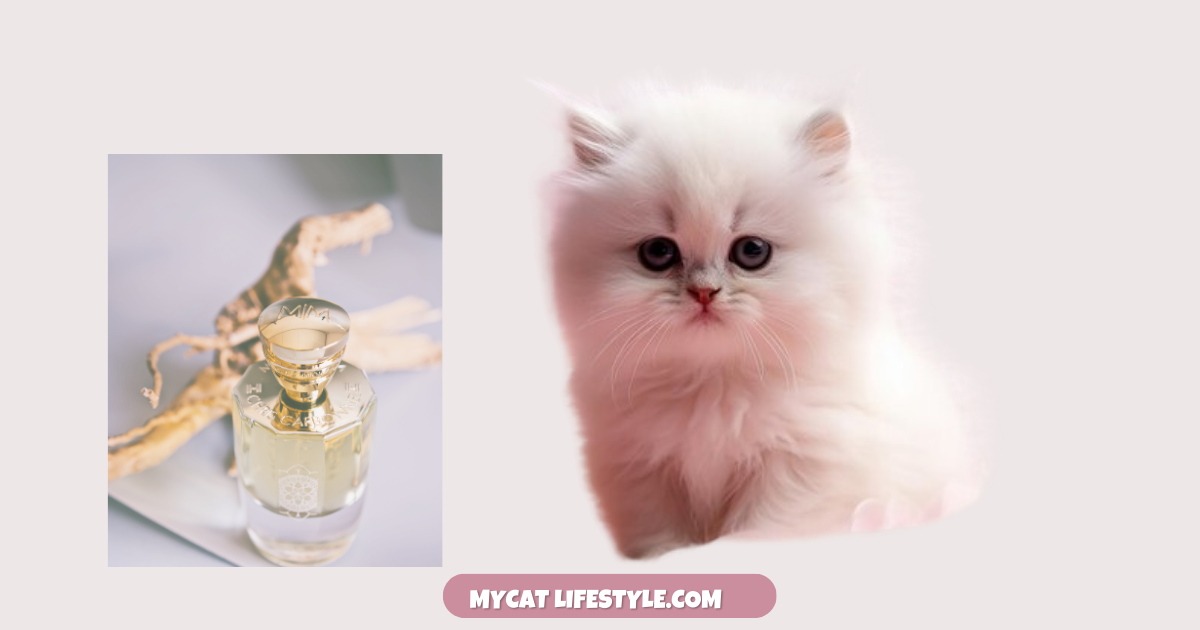
Cats have an extremely acute sense of smell, and their bodies cannot metabolize some compounds contained in fragrances. This implies that applying perfume to your cat might result in irritation, allergic reactions, or even more serious health problems.
But don’t worry, there are several safe options for individuals who want their kitties to smell nice without endangering their health. Here are some suggestions for selecting a safe scent for your cat:
1. Look for natural elements
2. Stay away from synthetic scents
3. Use essential oils with caution
(Frequently Asking Questions)
Q: Can I spray my perfume on my cat?
No, it is not advisable to spray human perfume or aroma on your cat. Cats have a far greater sense of smell than humans, and the concentrated aroma of perfumes can be overpowering, if not annoying.
Q: Can perfumes be harmful to my cat’s health?
Certain perfume constituents, such as alcohol and essential oils, can be hazardous to cats if consumed or absorbed via their skin. They are capable.
Q: Why does my cat enjoy the aroma of my perfume?
Cats have a good sense of smell and may be rather choosy about the odors surrounding them. Cats are known to display an interest in several things. Why do cats adore perfume?
It’s very unusual to discover a cat rubbing against a perfume bottle or even licking it off your skin. But why are cats so fond of perfume? Let’s look into some of the probable causes of this strange behavior.
- Scent-attracted:
- Imitation of innate instincts:
- Associating fragrance with comfort:
- Attaining attention:
Q: What smell will keep cats away?
There are a range of smells that can be beneficial in keeping cats away. However, not all fragrances are suitable for use around cats. Some smells are even toxic and should never be put on or around your kitty buddy.
Q: Is Cat Perfume Safe?
Cats are renowned for being careful groomers, licking and polishing their hair for hours on end. This implies that anything that is put on their coat will end up in their mouth and digestive system. When cats consume perfume elements such as essential oils and chemicals, they can become harmful.
Q: Can Perfume Kill Cats?
Some individuals feel that the powerful fragrances and chemicals in perfumes are harmful to cats, while others say they are not. So, does perfume have the potential to harm cats? The simple answer is that applying perfume to your cat might be fatal. Cats are particularly sensitive animals with bodies that cannot digest some drugs as well as humans.
Finals Lines:
You must never spray perfume on your cat. While it may appear to be innocuous and may even make your cat smell nice, it can have major health and well-being effects.
To begin with, kittens are highly sensitive to odors and fragrances. They have an acute sense of smell, and any strong or artificial aroma might be overpowering. Spraying perfume on your cat can cause discomfort, anxiety, and even respiratory problems including coughing and sneezing.
Another issue to consider when spraying perfume on your cat is the possibility of allergic responses. Cats, like people, might be allergic to certain odors and chemicals found in perfumes. This can cause skin irritation, redness, itching, or other uncomfortable allergic responses for your furry friend.




